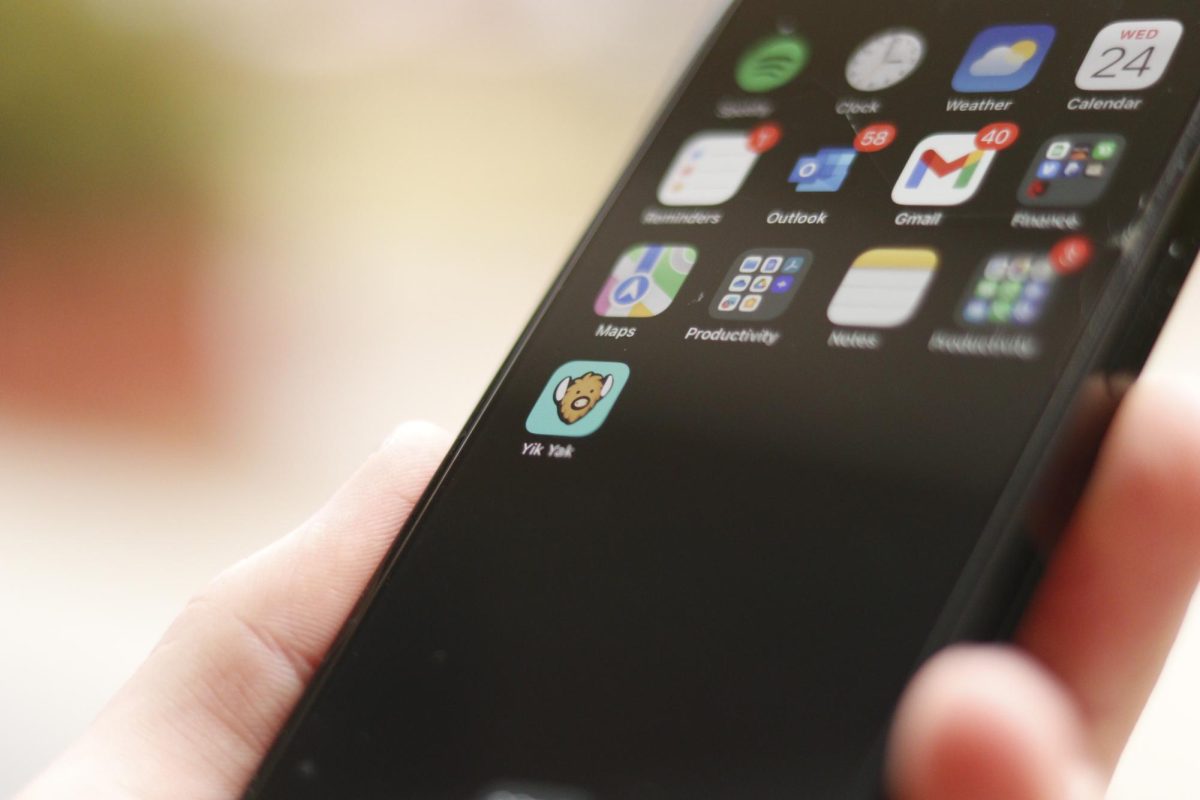YikYak, the anonymous social media app that shut down in 2017 after being banned by some schools amid criticism for cyberbullying, has steadily made its presence known at Chatham University since it reemerged under new ownership in 2021. Chatham students can log in with their student emails and get access to the Chatham YikYak feed where users anonymously discuss and gossip about college life and beyond.
Essentially, YikYak is a place that any grumpy old curmudgeon would rail against in the pages of your local newspaper. Before I downloaded the app, that’s what I planned to do, but YikYak is a two-headed beast.
For the most part, YikYak’s posts are benign, even enjoyable. Complaints about classes, funny anecdotes and discussions of relationships are mainstays of the app. But YikYak’s anonymous nature means there are little consequences for cruelty.
The first post I saw when I downloaded YikYak in October was someone calling for less negativity on the app, a relatively uncontroversial take. When I saw it had more than just a few comments, I clicked on it. Someone was throwing vile, racist comments at the original poster.
That moment started my months-long obsession with the app. For this story, I read semesters of posts and saw the worst of our campus. I’ve seen body shaming, misogyny and bigotry run rampant in comments and posts. I’ve seen people ask invasive questions about student athletes’ sexualities and relationship statuses.
I’ve also seen people use it to discuss the difficulty of classes they were considering taking. Students have asked about assignments, professors’ grading and how to use campus resources.
YikYak has been acting as an anonymous hub of information at Chatham, good and bad.
After YikYak returned, the new owners laid out the community guidelines to prevent further cyberbullying. YikYak has a one-strike policy if a poster violates the rules.
But the rules are weak, at best. For every protection put in place, there’s an easy loophole.
Staff and faculty are fair game for photos and public discussion in the guidelines, but students are supposed to have protections. Posting photos of other students is not allowed unless the face is blurred or covered by an emoji, the guidelines say. While you can’t name students specifically, initials are allowed. The guidelines leave a vague warning that any information that could potentially identify someone is against the rules.
Simply put, the rules aren’t made for a university like Chatham. At a small institution like ours, it’s not difficult to recognize people based on their clothes or hair in a photo with their face obscured. Initials aren’t particularly subtle either, and it begs the question of why YikYak has these loopholes at all.
Chatham’s YikYak feed has a perfect case study of the failures of these new guidelines. A user posted an image of two students in fursuits on the Shadyside campus. The comments were a mix of admiration, surprise and hate. One of the comments identified one of the students by their campus job and hair color, and a reply again identified the other by hair color.
At a larger institution like the University of Pittsburgh, a comment saying that someone had a unique hair color would not do much to identify someone, but that isn’t the case for Chatham. If I was able to figure out who the two students in the photo were, I’m likely not the only one.
Another post made fun of a student for swimming in the Athletic and Fitness Center’s pool while wearing a mermaid tail. Completely harmless, fun activities like dressing up have led to students being mocked by an anonymous crowd much too eager to name and shame.
This is the core issue of YikYak: the posters are anonymous, but the people they’re discussing may not be. YikYak’s one-sided anonymity means those targeted by negative posts and comments are facing the consequences of an app that, because of its anonymity, doesn’t even allow them to know who is harassing them.
With everything that I have seen, I could easily write off YikYak as a hellscape unfit for our phones. But after downloading it last semester, I confess that I probably use it more than most people on this campus. So perhaps better than most, I can say YikYak is the most dangerous thing for a social media app to be: YikYak is what we make of it.
It’s not inherently evil, but it’s a place where cyberbullying and hate can fester. It’s also a place where people have shared personal triumphs, moments of queer joy and difficulties they’ve been facing that otherwise may have gone unheard.
While I downloaded the app with the intention of tearing it to pieces, I found myself amazed and overwhelmed by the scope of its use. It is with this newfound appreciation for the app that I urge people to use it carefully and kindly. YikYak, at its best, is an entertaining place that lets students spread joy and useful information. At its worst, it doesn’t deserve to be back on the app store.








